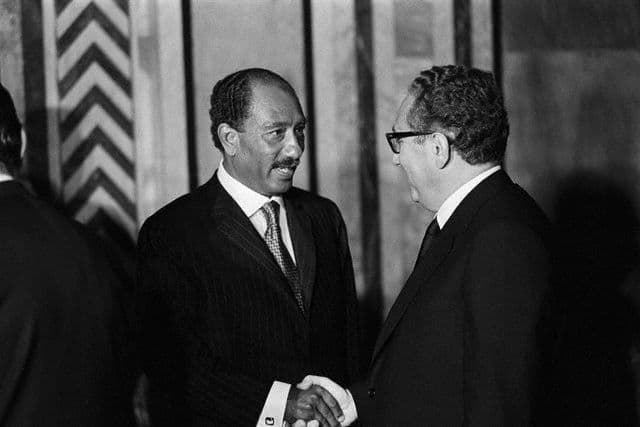A Kissinger Capitulation? Feature the Sinai in 1973
Most of what I learned about the 1973 war was gleaned from peeping through the periscope of a tank. So I’ll let the history scholar present the case for Mr. Kissinger’s rationale.

The firestorm lit by Henry Kissinger’s comments about the need to settle the Ukraine war’s outcome before Russia is utterly humiliated might well be rooted in one of the statesman’s greatest Cold War coups.
A Kissinger Center historian of the Cold War, Sergey Radchenko, argues today in a widely retweeted thread on Twitter that the “correct historical reference” for interpreting Mr. Kissinger’s remarks delivered by video telephone at Davos “is the October 1973 Yom Kippur War.”
I am not a historian, and most of what I learned about the 1973 war was gleaned from peeping through the periscope of a tank. It’s a narrow view not unlike that of a horse confined by blinders. So I’ll let the history scholar present the case for Mr. Kissinger’s rationale, which, as always, is rooted in the biggest of geopolitical bird’s eyes.
“If you recall,” Mr. Radchenko writes, in 1973 “Egypt and Syria attacked Israel, and it seemed like they would even win — at least for a few days. Then the tides turned, and Israel pushed back and crossed the Suez Canal. Within days, the Egyptians were surrounded and on the verge of collapse.”
Mr. Kissinger’s tactic, adds the historian, “was to allow Israel to defeat Egypt but not too much. Overdoing it risked all kinds of problems, including the possibility of a Soviet intervention and further troubles for the oil market (the Arabs imposed an oil embargo).”
That caused consternation among the Israelis, including a battlefield commander, Ariel Sharon, whose forces had managed to trap the Egyptian Third Army. Yet the result was a Cold War coup, which turned the Egyptian strongman, Anwar el-Sadat, into an American ally from a Soviet client.
“Leaving the Egyptians hanging in there,” Mr. Ratchenko writes, “opened up possibilities for US mediation, which Kissinger took advantage of, winning Sadat’s confidence and plying him away from Moscow. The result: the Israelis got something, Egypt got something. Moscow got screwed.”
The analogy to the current war — the idea that must be in Secretary Kissinger’s extraordinary mind — is that it would be a mistake to humiliate President Putin by utterly decimating his army in Ukraine.
Warning against a prolonged skirmish that could spread around the globe, as the dearth of Ukrainian and Russian grains become a famine, and cautioning that war fatigue would turn the West’s attentions elsewhere, Mr. Kissinger is advocating a ceasefire based on the Ukraine war’s status quo ante.
In the Cold War, Mr. Kissinger not only turned Egypt against its Moscow patron. He also set up President Nixon’s 1972 trip to Beijing, which helped to end a weak alliance between Communist China and the Soviet Union.
In Ukraine, Mr. Radchenko notes, Mr. Kissinger might well be prescribing a similar course. Offering an out for Mr. Putin may be a sign that Mr. Kissinger is “not averse to playing Russia against China in the long term, and so he is keen not to overkill Russia,” the historian writes.
All of which is much more of a well thought out strategy than that of other kibitzers advocating Russian-appeasing scenarios. Yet, even Mr. Kissinger can be right in the context of the Cold War and wrong in today’s state of the global power play.
For one, even Mr. Radchenko expresses skepticism about the prospect of playing Moscow against Beijing. During the Cold War, after all, Chairman Mao presided over a weak country.
Now that country is vying to replace America as the world’s top economic and military power — a goal Chairman Xi shares with Mr. Putin — separating them would be more difficult than in Nixon’s time, unless China or Russia is weakened to the degree China was in in the early 1970s.
The 1973 war in the Sinai was also different from the current situation in Europe. Mr. Kissinger finally intervened with the Israeli government headed by Kyiv-born Golda Meir, when the Israeli army did much more than merely turn around.
After General Sharon crossed the Suez Canal, Egypt’s Third Army was utterly defeated, and Sadat’s entire military force had exhausted all paths to a possible victory. For the Meir government, a return to the status quo ante, which at that time meant a retreat to its previous positions east of the Suez, was not too hard to concede.
That is far from the current stage of war. Yes, President Zelensky’s forces heroically repelled Russian troops on several fronts, including, most notably, at Kyiv. The Russian army, though, is yet to suffer the kind of humiliation inflicted on the Egyptians three weeks after their surprise attack on Yom Kipur.
A return to the status quo ante, in Ukraine’s case, would entail a Russian handover of areas it has captured since the beginning of its invasion, such as devastated Mariupol. Because Mr. Putin envisions cutting off Ukraine’s access to the Azov and Black seas, it would be hard to convince him to cede such regions.
It is also difficult to convince Kyiv to trust any ceasefire agreement the Kremlin signs. Mr. Putin, after all, denied he planned to invade up to the moment he in fact did.
Wars, moreover, do not end when foreign policy luminaries or newspaper editorial boards wish them to do so. They end either when one side is utterly defeated or both are exhausted and no longer wish to engage in battle.
In 1973, war ended after Israel defeated the Syrians and Egyptians. The Ukraine war, in contrast, is still raging and neither side is ready to concede defeat or lay arms down. Rather than prematurely dictate endgame terms, America would best help an allied democracy repel its invader.

